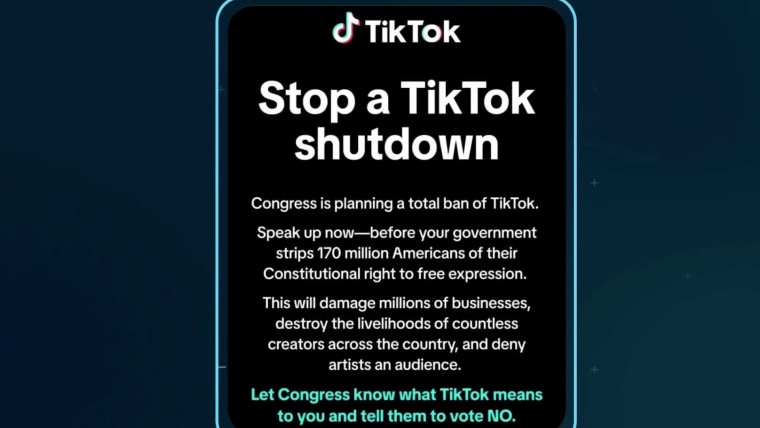The battle to ban TikTok is escalating.
A bill that would force TikTok’s Chinese owner ByteDance to divest the popular social media company passed a crucial vote Thursday, as the company sought to rally users to its defense with a call to action that flooded some congressional offices with phone calls.
The House Energy and Commerce Committee voted unanimously to pass the bill.
On Thursday, TikTok sent push notifications to some of its users to encourage them to call their representatives and ask them to vote against the bill. It displayed text that read "Stop a TikTok shutdown" in big, white letters before urging users to "speak up now."
In a statement, a TikTok spokesperson confirmed that a push notification was sent to users 18 and older in the U.S.
Mike Gallagher, R-Wis., who was among the authors of the bipartisan bill, said other House members told him that their offices were flooded by calls from constituents issuing their support for TikTok.
“I’ve heard they’re getting a lot of calls in our offices, for sure. Some members live in their office," said Gallagher, who chairs the select committee on the Chinese Communist Party. "I actually live in my office; it’s really glamorous. And they were saying that, you know, their phones are ringing off the hook last night."
The legislation comes roughly a year after TikTok CEO Shou Zi Chew testified before Congress about the app and its connection to the Chinese government. TikTok has maintained that data from its U.S. users is stored in the U.S. and that the Chinese government has no access to or control of the app.
The bill, which is being called the Protecting Americans from Foreign Adversary Controlled Applications Act, would give the president power, through entities like the FBI and other intelligence agencies, to identify certain social media apps as national security threats if they are deemed under the control of foreign adversaries, like China, Russia, Iran and North Korea.
House Majority Leader Steve Scalise, R-La., told NBC News that he would bring the legislation to the House floor “quickly.”
He later posted on X that the House will vote on it next week.
In response to the bill, a TikTok spokesperson said that “the government is attempting to strip 170 million Americans of their Constitutional right to free expression. This will damage millions of businesses, deny artists an audience, and destroy the livelihoods of countless creators across the country.”
Rep. Jamaal Bowman, D-N.Y., posted a TikTok message Thursday accusing his colleagues of “trying to ban TikTok.”
Bowman, who has 234,000 followers on TikTok, later told NBC News that he wants to see “comprehensive social media reform” and that he’s probably opposed to the legislation at this point.
“Once again, it just feels like we’re singling out TikTok, and I don’t quite understand why,” he said.
Gallagher has pushed back against the word “ban” repeatedly.
“TikTok is characterizing it as an outright ban, which is, of course, an outright lie,” he said. “It’s not a ban. ... As long as ByteDance no longer owns the company, TikTok can continue to survive. People can continue to do all the dumb dance videos they want on the platform or communicate with their friends and all that stuff.”


